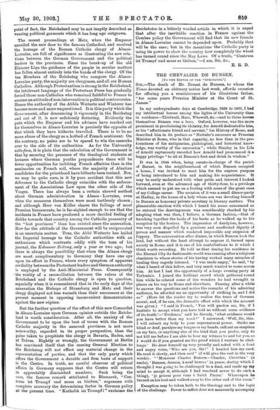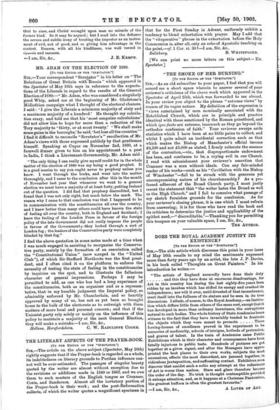THE CHEVALIER DE BUNSEN.
[TO TUE EDITOR OP THE "SPECTATOR."]
STR,—The death of Mr. Ernest de Bunsen, to whom the Times devoted an obituary notice last week, affords occasion for offering you a reminiscence of his illustrious father, " for some years Prussian Minister at the Court of St. James."
In my undergraduate days at Cambridge, 1829 to 1833, I bad my intellectual heroes among the lights of the University then in residence—Thirlwall, Hare, Whewell, dre.—and to thdse heroes themselves Bunsen was a hero. Oxford, however, was the more prominent in proclaiming its idolatry, for Arnold dedicated to him, as his "affectionate friend and servant," his History of Rome, and described him in its preface as " Niebuhr's successor as Prussian Minister at Rome, who in that capacity, no less than in the pro-, foundnesa of his antiquarian, philological, and historical know- ledge, was worthy of the succession"; while Stanley in his Life of Arnold rapturously recorded how Arnold had pronounced it a happy privilege "to sit at Bunsen's feet and drink in wisdom."
It was in 1844 when, being curate-in-charge of the parish. of Barnet, in the neighbourhood of which Bunsen occupied a house, I was invited to meet him for the express purpose of being introduced to him and making his acquaintance. It may be easily understood with what pride and interest I looked forward, even at the advanced age of thirty-four, to a privilege which seemed to put me on a footing with some of the great ones of my College career. The occasion of it was a small dinner-party at Hadley, in the house of a lady whose son was devoting himself to Bunsen as honorary private secretary in literary matters. The pleasurable emotion with which I heard his name announced as he entered the drawing-room was considerably checked by his adopting what was then, I believe, a German fashion,—that of knocking together the heels of his boots as he walked up to his reception by the hostess. The impression of dandyism, however, was very soon dispelled by a gracious and unaffected dignity of person and manner which rendered impossible any suspicion of foppery. The conversation after dinner, in which Bunsen took the lead, but without the least attempt to engross it, turned upon society in Rome, and it is one of his contributions to it which I think worth recording. He told us that during his residence in the Eternal City its fashionable world was running after a religious charlatan to whose stories of his having worked many miracles of healing they eagerly listened. " I was made angry," he said, " by what I heard of this fellow, and very much wanted to come across him. At last I had the opportunity of a large evening party at Torlonia's. I joined the brilliant crowd which gathered round him while he related some of the wonders he had wrought in places on his way to Rome and elsewhere. Pausing after a while to answer the questions and notice the remarks of his admiring audience, he afforded me an opportunity of striking in, and I did so." (Here let the reader try to realise the trace of German accent, and, if he can, the dramatic effect with which the account was given.) "I said in French, You will pardon me, Sir, if I hesitate to accept what you have told us without some evidence of its truth.'—' Evidence,' said he fiercely, what evidence would you have better than my word ?' I answered, Well, Sir, this. I will submit my body to your supernatural power. Strike me blind or deaf, paralyse my tongue or my hands, call out an eruption on my face, or anything else of the kind that you prefer, only do not kill me before I am able to bear my witness to and for you, as I would do if you granted me the proof which I venture to chal- lenge.' He drew himself up very proudly and asked with a loud and angry voice, Who are you, Sir ?' I handed him my card. He read it slowly, and then said" (I will give the rest in the very words) : "'Monsieur Charles Bunsen—Charles, Christian' (a smile), Bunsen, demain,a neuf heures ' (a pause, during which I thought I was going to be challenged to a duel, and made up my mind to accept it, although I had resolved never to do such a thing), je prierai pour vous I. Saint Pierre.' Whereupon he turned on his heel and walked away to the other end of the room."
Exception may be taken both to the theology and to the logic of the challenge. Power to inflict does not necessarily accompany that to cure, and Christ wrought upon man no miracle of the former kind: So it may be argued,-' but I read into the defiance the severe and subtle irony of treating the impostor as an instru- ment of evil, not of good, and so giving him advantage in the contest. Bunsen, with all his kindliness, was well versed in ripowe(a and sarcasm.







































 Previous page
Previous page